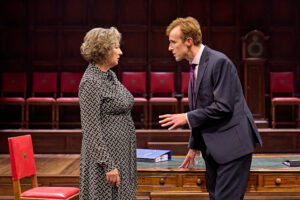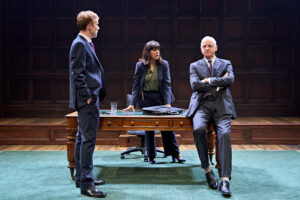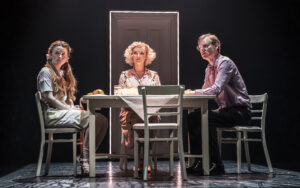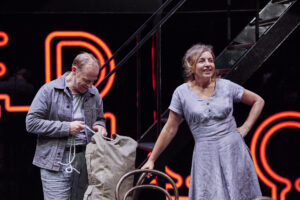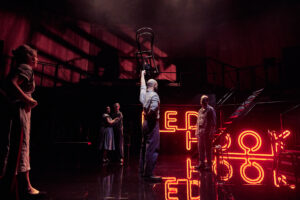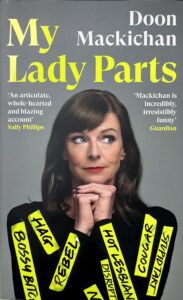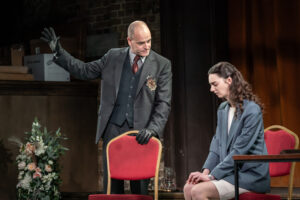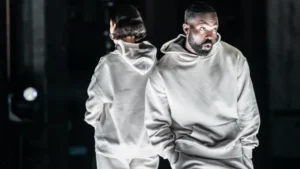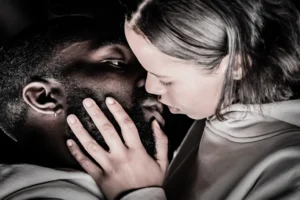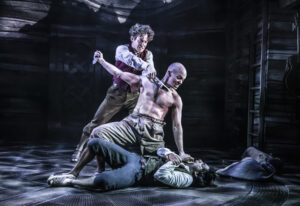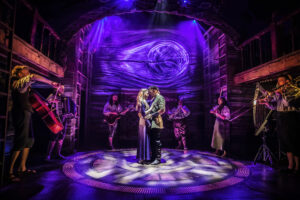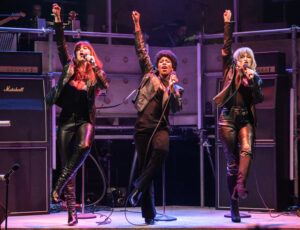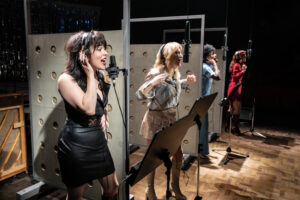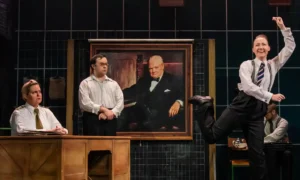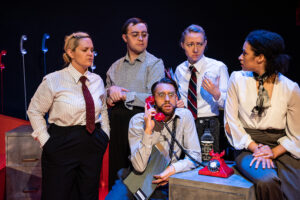Hi Alexander Zeldin reveals the extraordinary life of an ordinary woman
★★★★★
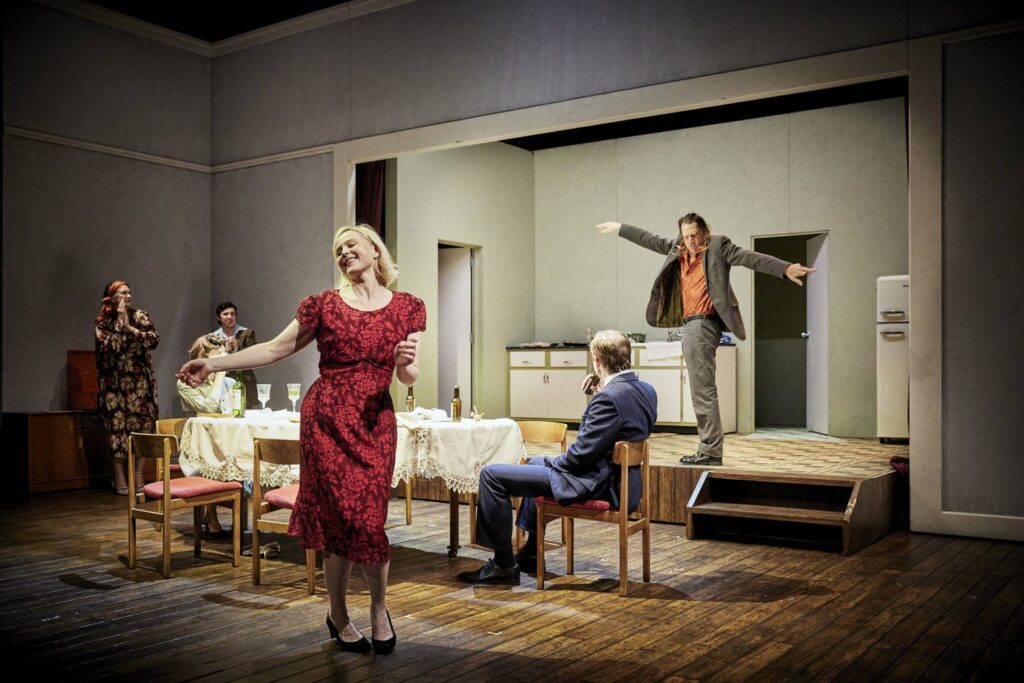
What does a person’s life amount to? How much do we really know about what went on, or goes on, in someone else’s life, even if we’re friends or family. Alexander Zeldin who has written a series of successful plays about ordinary people based on interviews, this time has decided to find out about his mother’s life, on the surface another ordinary person. A life she told him and tells us that is not interesting. Not an encouraging opening line when you know you have two hours without an interval to sit through but it turns out to be blatantly untrue.
Because, and this is part of what writer and director Mr Zeldin is saying, everyone has a story worth telling, if you tell it right. Which is what he does as he picks out key episodes from his mother’s life that show what women had to cope with in the sexist, racist sixties and seventies, first in conservative Australia and then in ostensibly progressive Europe, and how, as they say, what doesn’t kill us makes us stronger.
We first meet Alice as an older woman, played by Amelda Brown, standing in front of a red curtain. The curtain is drawn back and her story begins. Young Alice appears, acted by Eryn Jean Norvill. You can believe they are the same person at different stages of their life. Both have a ready smile and a vulnerability that make you empathise, as her creativity is suppressed by those around her: “You don’t need to set the bar at an unrealistic height for yourself,”says her first husband.
Also revealed is Marg Horwell’s clever set. It occupies a standard proscenium arch but, within that, there is smaller space , giving two areas for scenes to take place. Often we see the scenes changing, and how the set is constructed, as if all the memories are in the same space, in other words Alice’s mind.
The fact that it is patently a piece of theatre, from the set itself to the way the older Alice observes the younger one, sometimes smiling, sometimes distressed, enourages us to consider what is false memory, wishful thinking, interpretation, or just plain made up. Alice and a friend even argue over what happened in a particular shared memory- one we have witnessed earlier. As her second and much nicer husband says: both memories can be true. So it is clear that we are being told a story, and indeed our memories are a story we tell ourselves.
It is, as people are fond of saying these days, Alice’s truth, or perhaps to be absolutely fair, Alexander Zeldin’s interpretation of her truth, and as such it speaks to our hearts. Even while theatricality reigns, we are convinced of the truth of what we are being shown, and this is partly because the conversations between people are totally natural. They talk over one another, falter, and fail to finish sentences.
Many of the men in her life attempt to bring her down. We also see from early on how women, from school friends to her mother to a right-on feminist, try to undermine her confidence. Like the men, in order to make them feel better about their own situation, they have to diminish others.
A truly shocking scene of sexual assault
Alice’s first husband Graham is pretty nasty, but the worst man she meets is Terry, an art historian. Graham is initially stiff and shy but eventually is revealed as possessive and rigid in his thinking. He insists against her objections on having sex to make a baby (“I’ll only take a few minutes” he says).
Terry is big headed and narcissistic. She gets the better of him in an argument about art and he regains his self respect by raping her. A scene that is played out behind a door in excruciating silence. A truly chilling moment. Followed by an extraordinary scene of retribution in which the older Alice gets him to strip naked. She too takes clothes off, then denies him sex, thus teaching him a humiliating lesson in consent. I imagine the reason it’s the older Alice doing this is because it’s what she wishes she had done at the time rather than what actually happened.
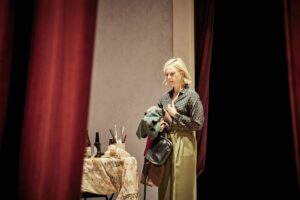
Both these brutal men are played by the same actor, Joe Bannister, who creates two very different characters but shows us that they are cut from the same threadbare cloth.
Similarly, the two women who try most to eat away at her confidence – her mother and the feminist Eva – are both played by Pamela Rabe, again an impressive acting achievement in creating two contrasting but comparable characters, one passive aggressive, the other a larger-than-life bully.
The other actors are just as talented, often in multiple parts, and often making the same point about similarities. Jerry Killick plays two obnoxious men, a neighbour Eldon and a lecturer Joss. Brian Lipson is Alice’s caring but ineffective father and her kindly but nervous companion Jacob.
Yasser Zadeh plays various sincere, emotional young men including her friend Leigh. Lilit Lesser as Pat, a naval officer, shows that men don’t have a monopoly on racism, militarism or immorality. Gabrielle Scawthorn is Alice’s friend Susie who swaps one restricted life for another.
A quick word of praise for the lighting by Paule Constable: the house lights stay up for the whole show but there are many subtle changes of mood. And Yannis Philippakis provides dramatic sonorous music.
In the end, you are uplifted by Alice’s ability to survive what her mother called a world full of hard surfaces, thanks to her resilience and self belief. There is a fantastic moment, when the smaller arch turns around completely and she steps through it like Pierrot in the painting by Watteau that she so admires.
When her son played by Lilit Lesser, who could be the author, eventually arrives on the stage and is revealed as a rude, angry teenager, we have proof that children don’t know their parents and only see them from their selfish point of view, unless they take the trouble to find out more, as the brilliant Alexander Zeldin has, in this extraordinary story of an ordinary life.
The Confessions can be seen at The National Theatre until 4 November 2023 and then at Comédie de Genève (8-12 November), Théâtre de Liège (15-18 November) and Comédie de la Clermont (22-24 November).
Paul paid for his own ticket.
Follow Theatre Reviews With Paul Seven on Threads, Mastodon, x (OneMinTheatre), Instagram and Facebook (One Minute Theatre Reviews)
Watch this review on the YouTube channel Theatre Reviews With Paul Seven
